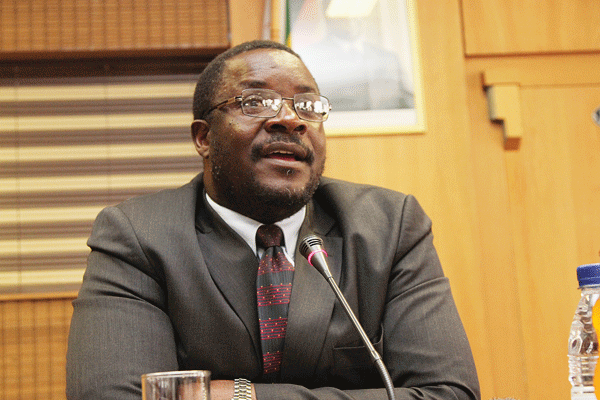
PRESIDENTIAL spokesperson George Charamba, in calling the new Zambian President Hakainde Hichilema derogatory names, has now really overstepped the mark and this while his boss was attending the inauguration ceremony. How embarrassing for President Emmerson Mnangagwa and our country to have a presidential spokesperson, no less, to utter such nonsense.
He is crude in the extreme and has not an ounce of diplomacy in him. Surely, Zanu PF can do better than that.
If he is not sacked now, then we can assume that his utterances are a true reflection of Mnangagwa and Zanu PF’s thinking.
If that is the case then Zimbabwe’s ambassador to the United States of America, Tadeous Tafirenyika Chifamba is wasting his time in trying to convince the US Senate that the second republic is better than the late former President Robert Mugabe regime. All evidence to date is that it is much more repressive despite all the talk of a new dispensation.
Zanu PF and the country can only blame the continuing sanctions on the double speak of the Executive. – A Mbire
Corporate capture driving corruption
CITIZENS in Action Southern Africa (CIASA) is concerned about the growing scourge of corporate capture which has become a serious vice affecting service delivery in Zimbabwe. This corporate corruption is driving high the cost of services rendered to citizens which results in loss of taxpayers’ money for otherwise shoddy services. This has also resulted in increase in national income leakages through illicit financial flows mainly through capital flight and trade misinvoicing.
In Zimbabwe, it appears that most major government projects, be they in natural resource exploitation, agriculture, commodities procurement, transport or even COVID-19-related purchases, are characterised by corporate-driven corruption. Examples include the US$28 million Drax International which plagued the Health and Child Care ministry in COVID-19-related procurement last year and also the US$54 million bus procurement scandal which sucked in President Emmerson Mnangagwa’s adviser Kudakwashe Tagwirei.
- Chamisa under fire over US$120K donation
- Mavhunga puts DeMbare into Chibuku quarterfinals
- Pension funds bet on Cabora Bassa oilfields
- Councils defy govt fire tender directive
Keep Reading
Auditor-General Mildred Chiri’s 2019 report also shows massive corruption in State-owned companies, ministries and local authorities which adversely affects service delivery.
All these and more cases have been captured extensively in the media
In addition to these cases, government, through the National Oil and Infrastructure Company, recently indicated that it had entered into a joint venture agreement with a British company, Coven Energy.
The objective of the venture is to build a US$1,3 billion pipeline from Beira, Mozambique to Zimbabwe in order to improve fuel supplies. While this is a noble development, the deal already has all the trappings of another corporate capture fiasco.
Investigations have shown that the purported British company was only formed a year ago and its physical address given as 1 Bolander Grove, Lillie’s Square, London, is in fact an apartment up for rental.
For government to have entered such a high-value deal with a shadowy company with no track record is inexcusable. This is moreso in light of recent corrupt deals where such big tenders have been given to dodgy companies that never delivered after receiving payments.
As CAISA, we therefore, call on the Zimbabwe Anti-Corruption Commission (Zacc) to undertake comprehensive investigations into the matter.
In addition, the National Prosecuting Authority (NPA) should take up cases recommended to it by Zacc and the cases should be diligently prosecuted.
As CAISA, we condemn the “catch and release” approach to prosecuting corruption cases, especially where top officials are involved. The Obadiah Moyo (US$28 million Drax case) and Prisca Mupfumira (US$90 000 NSSA loan)scandals are good examples.
We also call on Parliament to exercise its oversight role and call for the opening of contracts which government enters because they have a bearing on social services and the debt situation of the country.
Furthermore, we urge citizens, social movements and civil society organisations to take action and hold duty-bearers to account for their actions.
Ultimately, citizens are the biggest losers, thus must organise and build grassroots movements to demand transparency in government conduct. As a recommendation, Zimbabwe should also consider having external auditors outside the audit reports produced by the Auditor-General’s Office.- CIASA Corruption Watch
Lupane has no capacity to pay directors
I UNDERSTAND that Lupane Local Board (LLB) members will soon be upgraded to the position of directors in line with other urban local authorities in the country and also in line with government policy.
This is an unwise policy by government, especially when such promotions are accompanied by higher salaries. Where is the money going to come from to pay the so-called directors? What it is that they will direct?
Lupane town has no economy to write home about. The town is a glorified growth point existing pretty much below the level of a subsistence economy.
The local authority draws its revenue (of plus-minus 11%) annually almost exclusively from rates and the informal sector. How much is the gross and take home salaries of the town secretary, never mind the salaries of subordinate directors? Furthermore, some officers or should we say directors are still in universities.
This entails regular absenteeism from work (on full pay I suppose!) This obviously entails a dislocation of continuity in the operations of the LLB management and service delivery: in other words the residents are continually being shortchanged in respect of service delivery. The so-called caretakers don’t even bother to know what is happening in the local authority. It’s none of their business, they say.
By creating directorships in blanket fashion without separating metropolitans, municipalities and local boards is childish and incongruous with basic economic fundamentals. Harare’s financial base is not the same as that of LLB or any other local boards for that matter. I am not saying or implying that employees must not improve their education.
Some of us studied as employees. However, we did so in our own time, in the main, without prejudice to the employer. The other question is: how were these employees engaged in the first place when they did not have the qualifications that they are now pursuing? The residents are paying them for service delivery and fulfilment of contractual duty.
On their part, the residents must wake up and demand their rights and entitlement and make certain that they get value for money. Martin Stobart











